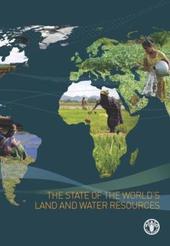
|
The State of the World's Land and Water Resources for Food and Agriculture: Managing Systems at Risk
Hardback
Main Details
| Title |
The State of the World's Land and Water Resources for Food and Agriculture: Managing Systems at Risk
|
| Authors and Contributors |
By (author) The Food Agriculture Organization of the United Nations
|
|
By (author) Olivier Dubois
|
| Physical Properties |
| Format:Hardback | | Pages:320 | | Dimensions(mm): Height 260,Width 180 |
|
| Category/Genre | Management of land and natural resources |
|---|
| ISBN/Barcode |
9781849713269
|
| Classifications | Dewey:333.73 |
|---|
| Audience | | Postgraduate, Research & Scholarly | |
|---|
| Illustrations |
26 black & white tables, 12 colour tables, 13 colour illustrations, 34 colour line drawings
|
|
Publishing Details |
| Publisher |
Taylor & Francis Ltd
|
| Imprint |
Earthscan Ltd
|
| Publication Date |
7 November 2011 |
| Publication Country |
United Kingdom
|
Description
The State of Land and Water Resources (SOLAW) is FAO's first flagship publication on the global status of land and water resources. It is an 'advocacy' report, to be published every three to five years, and targeted at senior level decision makers in agriculture as well as in other sectors. SOLAW is aimed at sensitizing its target audience on the status of land resources at global and regional levels and FAO's viewpoint on appropriate recommendations for policy formulation. SOLAW focuses on these key dimensions of analysis: (i) quantity, quality of land and water resources, (ii) the rate of use and sustainable management of these resources in the context of relevant socio-economic driving factors and concerns, including food security and poverty, and climate change. This is the first time that a global, baseline status report on land and water resources has been made. It is based on several global spatial databases (e.g. land suitability for agriculture, land use and management, land and water degradation and depletion) for which FAO is the world-recognized data source. Topical and emerging issues on land and water are dealt with in an integrated rather than sectoral manner. The implications of the status and trends are used to advocate remedial interventions which are tailored to major farming systems within different geographic regions.
Author Biography
FAO (Food and Agriculture Organization) is a specialized agency of the United Nations and was founded over 65 years ago. It plays a leading role in international efforts to combat hunger. As part of the organization's core functions, FAO's staff of agronomists, foresters, fisheries and livestock specialists, nutritionists, social scientists, economists, statisticians and other professionals continually collect, analyse and disseminate data.
|